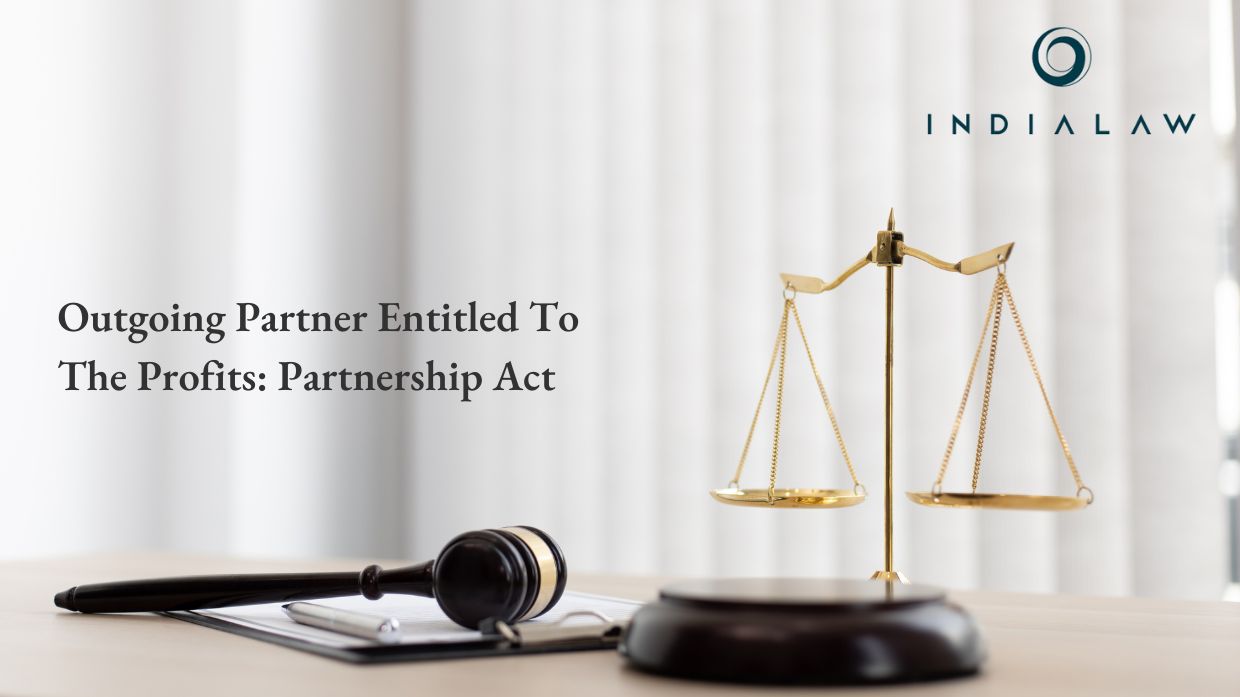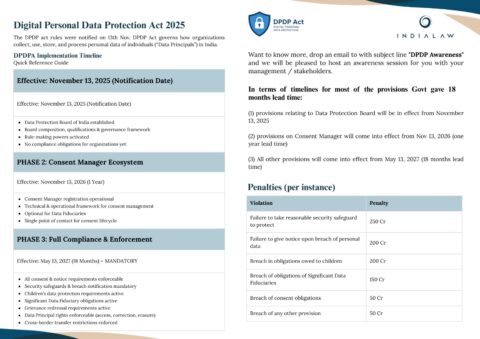Outgoing Partner Entitled To The Profits: Partnership Act

The Hon’ble Supreme Court (“Hon’ble SC“) in its recent judgment[i], held that in an event, a partner is carrying out business with the assets of the firm, he is entitled to his share of profits until a final settlement is made.
Table of Contents
Facts of the Case:
The First Respondent (i.e., the Original Plaintiff) instituted Suit No. 286 of 1978 before the Court of the II Additional District Judge, Pondicherry (“Trial Court“), inter alia, for the following:
(a) dissolution, settlement of accounts, and distribution of shares of a partnership firm, namely, Crystal Transport Service (“the firm“);
(b) appointment of a receiver to take charge of the management and assets of the firm until it is wound up; and
(c) restraining the defendants from recovering, receiving, or disposing of the property and effects of the firm.
The First Respondent’s case was that a partnership firm was constituted in the year 1972–1973, with four partners (the Original Plaintiff and Defendant Nos. 1 to 3), each holding one-fourth share. The partnership was at will. In 1978, without the Plaintiff’s consent, Defendant Nos. 1 to 3 diverted funds of the partnership firm to a private limited company (Defendant No. 4 – Appellant No. 1 herein), and when the Plaintiff demanded accounts from Defendant Nos. 1 to 3, they refused. Aggrieved by this, the aforesaid suit was instituted.
The Appellants contested the suit, claiming that the firm was constituted on 7th July, 1971, with effect from 1st May, 1971; it was not a partnership at will; a joint-stock company was formed with the approval of all partners, including the Plaintiff; and by an agreement dated 25th June, 1978, all assets and liabilities of the firm were transferred to the Fourth Defendant (“Appellant No. 1”).
The Trial Court passed a preliminary decree on 19th September, 1988, inter alia, in the following terms:
(i) The firm stands dissolved with effect from 07.10.1978 in terms of Section 42(b) read with Section 44(g) of the Indian Partnership Act, 1932.
(ii) The Plaintiff has one-fourth share in the firm.
(iii) Accounts shall be taken up to the date of dissolution, as per Order XX Rule 15 of the Code of Civil Procedure, 1908.
(iv) Defendants 1 to 3 shall, inter alia, file a statement of final accounts along with a balance sheet and a profit and loss account duly audited for the last five years prior to the date of dissolution.
(v) The prayer for the appointment of a receiver shall be considered after the final accounts, balance sheet, etc., are filed.
(vi) The suit against the Fourth Defendant (First Appellant herein) is dismissed.
(vii) Both sides shall bear their own costs.
Appeals and Cross-Objections Filed by the Parties:
Aggrieved by the Trial Court’s decree, the Original Plaintiff preferred First Appeal No. 215 of 1988. The said First Appeal was allowed by the Judgement and Order dated 8th August, 1989. The said Judgement, inter alia, decided two important aspects:
(i) The firm shall stand dissolved with effect from 15.11.1978 (i.e. the date of institution of the suit).
(ii) The decree shall bind the Fourth Defendant (i.e. the First Appellant herein).
A Second Appeal was preferred against the Appellate Court Decree, which failed.
Subsequently, an application was filed to appoint a Court Receiver to ascertain the exact amount payable to the Original Plaintiff and to pass a final decree in terms of the preliminary decree. The Trial Court passed a final decree on 23rd April, 2004.
Aggrieved by the final decree, the Original Plaintiff preferred First Appeal No. 328 of 2005, inter alia, claiming that the final decree was based on non-proven reports; objections to the report were not considered; documents submitted were not taken into account; and the prayer to change the receiver was not properly dealt with. The Hon’ble High Court, after hearing the parties, directed the Trial Court to appreciate the materials placed on record in the right perspective, in accordance with the law, and proceed with the contentions put forth by the respective parties, passing appropriate orders in the petition preferred by the Plaintiff for the appointment of a fresh receiver to look into the accounts of the firm and ascertain the amount payable to her.
A cross-objection was also preferred by the Appellants to the final decree. Their contention was that the preliminary decree of the First Appellate Court formed the basis for passing the final decree. Since the subject matter of the suit and the decree passed by the First Appellate Court was only with reference to the two buses, and the decree also stipulated that the suit firm stood dissolved from 15th November, 1978 and directed that the accounts be taken only for the period from 1st May, 1971 to 15th November, 1978, the Trial Court had erred in embarking upon an inquiry regarding income derived after 15th November, 1978. This argument was countered by the Plaintiff, who submitted that the assets of the firm had been taken over by the Fourth Defendant even before the Plaintiff could realize the fruits of the decree. Therefore, bearing in mind the provisions of Section 14 and 37 of the Indian Partnership Act, the profits generated even post-dissolution should be accounted for by the Fourth Defendant until accounts are finally settled as per the final decree. The First Appellate Court accepted the Plaintiff’s submissions and rejected the cross-objection.
Analysis by the Hon’ble Supreme Court:
The Hon’ble SC observed that there was no serious challenge to the findings in the impugned order, which indicated that the parties were not given a proper opportunity to prove or question the reports that formed the basis of the final decree. For the aforesaid reason, as well as for the detailed reasons recorded in the impugned order as to why the matter was being remanded, the Hon’ble SC found no good ground to interfere with the remand order.
The Hon’ble SC considered the rival submissions and, having perused the records, noted that in the preliminary decree, inter alia, there was a clear direction to the effect that:
“In taking accounts, the Commissioner shall have due regard to Sections 37 and 48 of the Indian Partnership Act[ii].”
Therefore, the Hon’ble SC concluded that the finding on record was that the Fourth Defendant (the Appellant company) had taken over the assets of the firm. In light of the provisions of Section 37 of the 1932 Act, if the Fourth Defendant is carrying on business with the assets of the firm until a final settlement is made, the Plaintiff, as an outgoing partner, has the right to seek accounts and a share in the profits derived from their share in the assets of the firm.
In author’s opinion, the aforesaid judgment comes to the rescue of the all the outgoing partners by reinforcing the statutory provision of the Indian Partnership Act, 1932. According to section 37 of the Indian Partnership Act, 1932, the outgoing partner of the firm has been vested with certain rights and obligation. The Hon’ble Supreme Court, in the aforesaid judgement highlighted the existing rights of the outgoing partner to to seek for accounts and a share in the profits derived from their share in the assets of the firm, provided that no final settlement has been done amongst all the partners of the concerned firm. Thus, from the present judgment, the outgoing partner is entitled to a share of profits derived from firm assets used post-dissolution.
[i] M/s. Crystal Transport Private Limited and Anr. (Appellants) v. A. Fathima Fareedunisa and Ors. Civil Appeal Nos. 7709–7710 of 2023 decided on 8th November, 2024.
[ii] Section 37. Right of outgoing partner in certain cases to share subsequent profits
Where any member of a firm has died or otherwise ceased to be a partner, and the surviving or continuing partners carry on the business of the firm with the property of the firm without any final settlement of accounts as between them and the outgoing partner or his estate, then, in the absence of a contract to the contrary, the outgoing partner or his estate is entitled at the option of himself or his representatives to such share of the profits made since he ceased to be a partner as may be attributable to the use of his share of the property of the firm or to interest at the rate of six per cent. per annum on the amount of his share in the property of the firm:
Provided that where by contract between the partners an option is given to surviving or continuing partners to purchase the interest of a deceased or outgoing partner, and that option is duly exercised, the estate of the deceased partner, or the outgoing partner or his estate, as the case may be, is not entitled to any further or other share of profits; but if any partner assuming to act in exercise of the option does not in all material respects comply with the terms thereof, he is liable to account under the foregoing provisions of this section.
Section 48. Mode of settlement of accounts between partners.
In settling the accounts of a firm after dissolution, the following rules shall, subject to agreement by the partners, be observed: —
(a) Losses, including deficiencies of capital, shall be paid first out of profits, next out of capital, and, lastly, if necessary, by the partners individually in the proportions in which they were entitled to share profits.
(b) The assets of the firm, including any sums contributed by the partners to make up deficiencies of capital, shall be applied in the following manner and order:–
(i) in paying the debts of the firm to third parties;
(ii) in paying to each partner rateably what is due to him from the firm for advances as distinguished from capital;
(iii) in paying to each partner rateably what is due to him on account of capital; and
(iv) the residue, if any, shall be divided among the partners in the proportions in which they were entitled to share profits.
By entering the email address you agree to our Privacy Policy.



